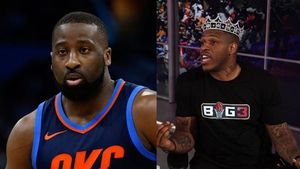Former President Donald Trump has found himself at the center of yet another controversy, this time over his comments about popular Latin music star Nicky Jam during a rally held recently in Las Vegas. Contextually, Trump made headlines for misgendering the singer, causing ripples of reactions across social media platforms.
Nicky Jam, widely recognized for his contributions to the reggaeton genre, was invited on stage during the event. Trump enthusiastically described him as "she's hot," mistakenly attributing female pronouns to the male artist as he tried to engage the crowd. "You know Nicky? She’s hot. Where is Nicky? Where is Nicky?" he exclaimed, creating confusion among attendees.
Trump quickly attempted to correct himself as soon as Nicky Jam walked up to the stage, reportedly saying, "Oh, look—I'm glad he came up." This rapid turnaround highlights Trump's sometimes erratic speaking style, which has led to many memorable moments, though not all favorably received.
The incident did not go unnoticed. Kamala Harris's campaign took to Twitter to capitalize on Trump's faux pas, sharing the clip with the caption, "Trump: Latin music superstar Nicky Jam. Do you know Nicky? She’s hot" followed by the iconic laughing emoji. This social media interaction serves as yet another example of political rivals taking advantage of each other’s blunders, especially as the race for the White House continues to heat up.
Following the rally, representatives for Nicky Jam were unable to comment immediately, prompting speculation about the singer's personal feelings toward Trump's remarks. While it appears Jam has taken the misunderstanding lightly—he even shared a screenshot of the incident on his social media with dozens of laughing emojis—the error has reignited discussions about how public figures handle gender identity and misgendering.
This blunder is particularly noteworthy as it intersects with Trump's long history of controversial statements and behaviors. Throughout his political career, the former president has been criticized for both his language and for seemingly disregarding important social issues, including those surrounding the LGBTQ+ community.
For some, the error might seem dismissible. Still, politicos and critics argue it speaks volumes about biases and misconceptions prevalent among societal leaders. Misgendering can be more than just incorrect pronouns; it is often perceived as delegitimizing individuals who struggle for recognition and acceptance of their gender identities across various platforms, including popular culture and politics.
Trump's campaign team did not provide any immediate commentary on the incident either, which might indicate they are opting to downplay this misstep. Whether this will have repercussions for his support remains to be seen.
While responses to the gaffe varied, social media is buzzing with mixed reactions. Some Twitter users laughed it off, quoting Trump's misstatement, noting it as just another example of his long-standing verbal fumbles. Others voiced concern about the impact of such comments, drawing attention to the broader issues of misawareness and sensitivity surrounding personal identity.
This incident is reminiscent of previous gaffes Trump has made, wherein his sometimes cavalier attitudes toward serious topics have made him both beloved and reviled. For those questioning how the former president can continue to rally support amid such blunders, it poses important questions about the broader cultural and political landscapes affecting voter choices.
Equally, it illuminates the dynamics of political communications today, where swift reactions via social media platforms can amplify missteps, painting those involved in new, sometimes less favorable, lights.
Nicky Jam's event was originally meant to celebrate Latino representation and culture, reflecting the growing influence of Latin music and artists within mainstream American media. Trump's comments, now viewed through the lens of this misgendering incident, could overshadow the positive representation intended for the evening.
So, as Trump continues to navigate the turbulent waters of his presidential campaign, observers and supporters alike wonder how this misstep could shape perceptions of his candidacy. Will it lead to increased scrutiny of his comments? Or will it be rapidly forgotten among the countless headlines—both good and bad—that seem to flock around his public persona?
The incident serves as yet another reminder of the rapidly changing social dynamics within both pop culture and politics, where being culturally aware and sensitive to identity issues remains ever more relevant. With public figures continually influencing public opinion, the conversations surrounding gender identity and representation become central, asserting themselves at the intersection of popular culture and political discourse.
Trump's rally, rather than purely being another campaign event, transformed through this miscommunication. It captured the attention of not just attendees but also the many millions who are tuned in to how everyone, regardless of their political allegiance, discusses and addresses gender, representation, and identity.
How the public reception will play out remains somewhat unclear, but one thing is certain: Trump’s misstatement has reignited conversations about identity, representation, and the responsibility of public figures to be aware of the language they use. The stakes are high as voices advocate for respectful recognition across diverse identities—doing so with awareness can either build bridges or widen divides. Time will tell if this moment serves as just another headline or leads to more significant discussions within the political sphere, especially closer to the elections.



